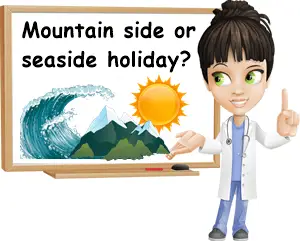There are benefits to a seaside holiday as there are to a mountain holiday. But for some people, going on holiday has to take into account existing health conditions which might restrict certain holiday destinations or recommend others for their benefits. Certain holiday destinations may imply more risks for asthma sufferers or arthritis sufferers for example, while others might just help improve the problematic health aspects of these conditions. Fortunately, there are health benefits to both a seaside holiday and a mountain holiday and ways to maybe enjoy both and good health.
Where you choose to spend you holiday says plenty about your personality and the type of activities you like, but it can also say plenty about your health. For example, someone who likes the beach and would rather go on holiday to the seaside has to like warm weather and should do better during a heatwave than someone who would rather go somewhere cold. A person who likes the mountains also typically likes colder weather and rather athletic activities outdoors, like hiking, skiing or other winter sports.

A person with joint pain would rather choose a warm summer destination than a cold holiday in the mountains. The seaside would definitely allow for some healthy sun exposure to warm up bones and joints and maybe help with the arthritis pain. Going to the beach also doesn’t imply any serious physical effort, which might also constitute an advantage for someone with mobility problems. Someone with multiple pollen allergies might choose to avoid the mountains in certain periods of the year for fear of exposure to allergens, but might consider the beach as a low-risk alternative. A person with shellfish allergies might definitely avoid the seaside, but instead choose a mountain holiday.
What makes for a good holiday is your choice of holiday being compatible with your hobbies, expectations of this off time, budget, of course, and, just as important, health. As depicted in the examples above, different medical conditions might impose certain restrictions when it comes to choosing your holiday destination because there may be real risks associated with certain climates, flora, gastronomies etc. The important thing is to know the restrictions of the conditions you are living with and the disadvantages and advantages of various holiday destinations relative to your medical conditions.
Seaside destination
So what are the benefits of a seaside holiday and the potential restrictions associated with this choice of a holiday destination?
1) A seaside holiday can be good for the elderly or anyone suffering from rheumatism or arthritis because sun exposure can help improve joint pain and muscle pain. People with pain left from broken bones can also enjoy a certain degree of pain relief during a holiday at the beach.
2) The ocean air is good for people suffering from various forms of lung disease (like Chronic Obstructive Pulmonary Disease) or children prone to chest infections. Research shows they may experience better breathing, reduced mucus, wheezing and coughing and overall improved lung function.

3) Asthma and allergy sufferers may benefit from a seaside holiday as the salty air can help clear up mucus, improve breathing and reduce wheezing and nasal congestion. Just as important, there aren’t usually many flowering plants at the beach, so the chances of coming into contact with allergenic pollen material are low.
Important. Asthma sufferers should avoid going into cold water suddenly, but instead gradually get used to the sea or ocean temperature if they want to go for a swim. A thermal shock like getting into cold water suddenly can trigger a potentially serious asthma attack in both children and adults.
4) The seaside is a good therapy for osteopenia and osteoporosis sufferers. Sun exposure is the main source of vitamin D production and people with frail bones that put them at risk for bone fractures could benefits from more vitamin D because the nutrient stimulates calcium absorption. A vitamin D deficiency is a cause for bone loss and an increased risk of osteoporosis (The effect of vitamin D on bone and osteoporosis).
5) The seaside boosts immunity. Children and adults with frequent respiratory infections and relatively poor immunity could benefits from a seaside holiday because it helps them produce more vitamin D to boost the immune system, while the salty air is beneficial for the respiratory system. Research also suggests sufficient sun exposure could reduce the risk of multiple sclerosis and immune system disorders, cancer and hypertension (Benefits of Sunlight: A Bright Spot for Human Health).
6) Skin benefits. A seaside holiday can help with dermatitis, psoriasis, even acne and other skin disorders. The sun exposure can trigger immunosuppression, helping with skin disorders caused by an overactive immune system while the salty water and the relaxation experienced all contribute to better skin health.
7) A seaside holiday can help reduce stress and possibly help improve mental illness such as anxiety. Sun exposure itself is a very relaxing activity and can help release endorphins, contributing to a state of happiness and well-being which can have benefits of mental health.
Risks may include: thermal shock for asthma sufferers, heatstroke or insolation, heatwave, shellfish allergies, sunburns, increased risk of skin cancer with excessive sun exposure or lack of use of sun lotion, eyesight degradation.
Mountain destination
What are the benefits of a holiday in the mountains and the potential restrictions associated with this choice of a holiday destination?
1) Relaxation and solitude. A holiday in the mountains can allow for alone time and peace and quiet. Not everyone is looking for group activities and vacationing in the mountains gives you the possibility to go on a hike by yourself and enjoy the fresh smell of fir trees, the singing of the birds and the relaxation that comes with not having to entertain a discussion.
2) Promotes mental health. There is something deeply reassuring about being one with nature. The connection you make with nature somehow gives you a sense of peace and balance that sparks great benefits for mental health. Research shows vacationing in the mountains, going camping or hiking, all the different relaxing smells of pine trees, earth or wild flowers help produce serotonin and improve mood. Moreover, the fresh air has a rejuvenating physical and mental effect, while the negative ions found in forest settings in the mountains have been shown potentially improve anxiety, depression, seasonal affective disorder and other forms of mental illness.
3) Improved sleep. Mountain side holidays are good for insomnia sufferers because spending time in nature, away from electronics and technology helps regulate circadian rhythms, contributing to regular, more restful and undisturbed sleep. The effects are more prominent for those spending a few night camping in tents. Spending time at higher altitudes where there is also a lower amount of oxygen can make one sleepy and contribute to this effect further, while hiking, skiing and other activities for those vacationing in the mountains are sure to make you tired enough to sleep.
4) Cardiovascular benefits. While high altitudes can cause oxygen deprivation, there are certain cardiovascular benefits associated with mountain holidays. The clean air, presence of negative ions, good level of physical activity ensure a good workout for the heart. Overall, the mountains are good for cardiovascular health, as long as you are healthy to begin with. Those suffering from cardiovascular disease or having experienced cardiovascular events such as infarction need their doctor’s approval for a trip in the mountains.
5) Reduced risk of obesity. While the seaside offers its share of entertaining and calorie-burning activities like swimming or surfing, there are not for everyone. However, vacationing in the mountains can help everyone burn some calories. If skiing, snowboarding and other winter sports are too intense for you, there is always hiking which offers a complete workout in beautiful natural settings. You can’t gain weight if you’re someone who loves the mountains.
6) Clean air promotes longevity. The mountains are the best source of clean air and it is this absolute lack of pollution that has been theorized to be one of the biggest secrets behind the longevous lives of centenarians across the world.
7) Potentially good for allergies. While there are plenty of allergens in the forest from wild flowers, molds and trees, in areas with high concentrations of negative ions, the air is theorized to be clean and free of allergens, making this natural setting good for allergy sufferers. However, not every mountainous region is allergy-friendly and you need to have you medication with you at all times if you are going on a hike.
Risks may include: risk of respiratory infections for those prone to them, not suited for lung disease sufferers, allergy risks in spring, summer and autumn from flowering plants in pastures or the forest, cold and humidity are bad for arthritis sufferers, hypoxia (oxygen deprivation at high altitudes), acute mountain sickness for those climbing at high altitudes fast, cardiovascular events for those with existing heart disease.
Conclusion
In the end, our health dictates our holiday destinations and preference for either the mountains or the seaside. It’s only natural that we would feel like going somewhere where we would actually have a chance of enjoying good health and avoid holiday destinations that might not agree with existing medical conditions. So whether you choose the seaside or the mountains, someplace in between or another holiday destination, make sure it contributes to your health.
